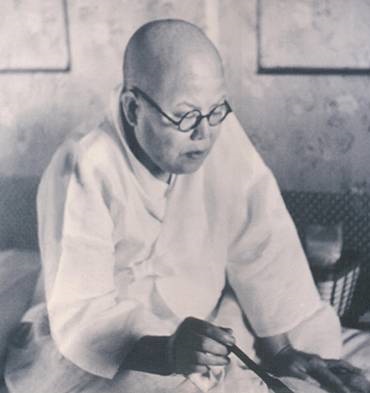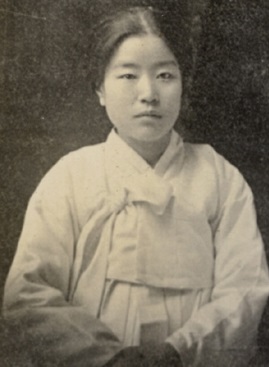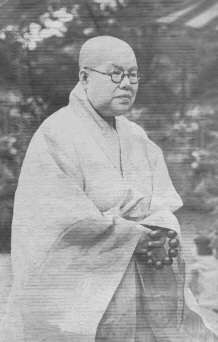ZEN MESTEREK ZEN MASTERS
« Zen főoldal
« vissza a Terebess Online nyitólapjára

김일엽 / 金一葉 Kim Iryeop (1896-1971)
Kim Il-yeop, Kim Iryŏp, Gim Iryeop (née 김원주; 金元周 Kim Wŏnju, Gim Wonju)
Interpreting Christianity from a Buddhist perspective, Korean Zen Buddhist nun/thinker Kim Iryŏp (金一葉 1896-1971) questions the dual postulation of good and evil, God (creator) and humans (created), and heaven and hell. For Iryŏp, good does not exist without thinking of evil, and heaven cannot stand by itself without our postulation of hell. God and humans are not two ontologically distinctive beings but two different states of beings. From the Buddhist perspective, the transcendent does not exist as the “wholly other,” as Rudolf Otto puts it in the Idea of the Holy. The ultimate being, be it God or the Buddha, does not attain the position of the ultimate being because of its ontological quality. Instead, a supreme being attains that position through its capacity to realize its full potential and its capacity to recognize the same potential in other beings. The Buddha or God, for Iryŏp, cannot be the exemplification of pure goodness; instead they should be able to encompass both good and evil by virtue of the mutual indebtedness of these binary concepts. With this reasoning, Iryŏp defines religion as an education to awaken each individual to his or her original capacity, whereby an individual can be released from suffering and live life as a free being.
(What is Philosophy of Religion? by Jin Y. Park)
PDF: Women and Buddhist Philosophy: Engaging Zen Master Kim Iryŏp
by Jin Y. Park
Honolulu, HI: University of Hawaii Press, 2017

Gendered Response to Modernity: Kim Iryeop and Buddhism
by Jin Y. Park
Korea Journal, Spring 2005, pp. 114-141.

PDF: Reflections of a Zen Buddhist Nun
Essays by Zen Master Kim Iryop
Translated by Jin Y. Park
Honolulu, HI: University of Hawaii Press, 2014
PDF online: https://muse.jhu.edu/books/9780824840235
The life and work of Kim Iryŏp (김일엽 / 金一葉, 1896–1971) bear witness to Korea's encounter with modernity. A prolific writer, Iryŏp reflected on identity and existential loneliness in her poems, short stories, and autobiographical essays. As a pioneering feminist intellectual, she dedicated herself to gender issues and understanding the changing role of women in Korean society. As an influential Buddhist nun, she examined religious teachings and strove to interpret modern human existence through a religious world view. Originally published in Korea when Iryŏp was in her sixties, Reflections of a Zen Buddhist Nun (어느 수도인의 회상, Ŏnŭ sudoin ŭi hoesang, 1960) makes available for the first time in English a rich, intimate, and unfailingly candid source of material with which to understand modern Korea, Korean women, and Korean Buddhism.
Throughout her writing, Iryŏp poses such questions as: How does one come to terms with one's identity? What is the meaning of revolt and what are its limitations? How do we understand the different dimensions of love in the context of Buddhist teachings? What is Buddhist awakening? How do we attain it? How do we understand God and the relationship between good and evil? What is the meaning of religious practice in our time? We see through her thought and life experiences the co-existence of seemingly conflicting ideas and ideals—Christianity and Buddhism, sexual liberalism and religious celibacy, among others.
In Reflections of a Zen Buddhist Nun, Iryŏp challenges readers with her creative interpretations of Buddhist doctrine and her reflections on the meaning of Buddhist practice. In the process she offers insight into a time when the ideas and contributions of women to twentieth-century Korean society and intellectual life were just beginning to emerge from the shadows, where they had been obscured in the name of modernization and nation-building.Hwansoo Kim. Review of Iryop, Kim, Reflections of a Zen Buddhist Nun: Essays by Zen Master Kim Iryop. H-Buddhism, H-Net Reviews. July, 2014.
https://www.h-net.org/reviews/showrev.php?id=41484Sujung Kim's Review of Reflections of a Zen Buddhist Nun
Front. Philos. China 2015, 10(3): 522–524.
http://www.academia.edu/20127910/Sujung_Kims_Review_of_Reflections_of_a_Zen_Buddhist_Nun
![]()
https://hu.wikipedia.org/wiki/Kim_Iljop
Kim Iljop (hangul: 김일엽; handzsa: 金一葉, 1896. április 28. – 1971. február 1.) volt koreai buddhista szerzetes, író, költő és feminista, liberális aktivista.
Valódi neve Kim Vondzsu (김원주; 金元周).
![]()
https://fr.wikipedia.org/wiki/Kim_Il-yeop